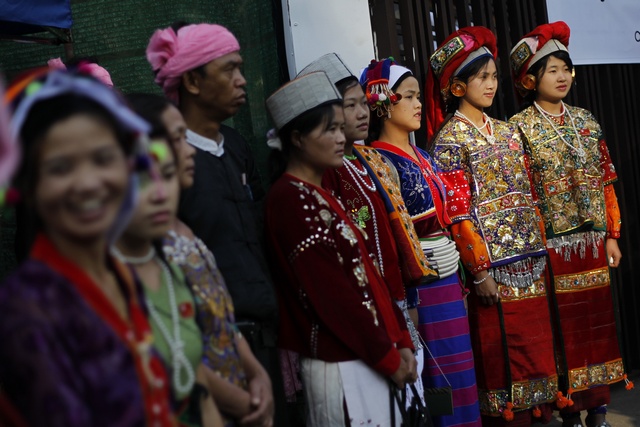As anticipated, the National League for Democracy (NLD) won a landslide victory in last week’s polls. This is a massive and historic achievement; nothing will be the same again in Burmese politics.
Over the past couple of days, a number of ethnic nationality friends have been in touch to express disappointment regarding the poor showing of ethnic political parties – at least beyond parts of Arakan [Rakhine], Chin and Shan states. A large majority of Burma’s citizens voted for change: out with the military-backed government, and in with ‘The Lady’. Many citizens who identify with their ethnic nationality (i.e. are proud to be Karen or Mon or Chin) nevertheless voted for the long-standing symbol of opposition to military rule. The ethnic vote was further weakened by the plurality of parties seeking to represent minority communities. Hopefully, next time round, ethnic elites will be able to ensure a less fragmented offering to the electorate, so that ethnic support does not risk being spread between different parties.
The relatively small number of MPs elected from ethnic nationality parties might create an impression that ethnic issued are not so relevant in Burma. This would be unfortunate. One of the most important developments over the past four years has been the emergence of ethnic issues as central elements in the country’s political narrative – because of the peace process, and also the relatively large number of MPs from ethnic political parties elected in 2010.
Over the next several months, international and domestic attention will inevitably focus on the transition from a USDP-led (military-backed) government, to one presumably under the authority of the NLD. Ethnic issues may slip back to the sidelines, and minority communities again experience marginalisation and neglect of their aspirations and concerns.
It should of course be noted that there are a number of ethnic nationality NLD MPs-elect, who will be keen to demonstrate that they can represent their constituents. None of these are Muslims.
The failure of Buddhist-nationalist populists to mobilise much support from the electorate is a relief. In all the excitement however, it is important to remember that much of the country’s Muslim community remains disenfranchised. The hope must be that a government led by Daw Aung San Suu Kyi will be sensitive to and address their concerns.
[related]
The NLD’s first priority will be to sound out the military. The Burmese army remains a key player, not least through its retention of 25 percent of parliamentary seats and lock on three key ministries. These provisions give the old guard a stake in the future parliament and power dispensation. Meanwhile, networks from the decades of military rule remain entrenched in the economy, together with their crony partners. In this respect, Suu Kyi’s comments the day after the election seem well chosen: “I want to remind you all that even candidates who didn’t win have to accept the winners, but it is important not to provoke the candidates who didn’t win to make them feel bad.”
Acknowledging the significant (albeit incomplete and contested) achievements of reformists within the outgoing regime will be an important step towards national reconciliation.
Turning to the peace process, there are questions regarding the future of a structured Political Dialogue coming out of the Nationwide Ceasefire Agreement or NCA, which was signed by the government, Burmese military and eight leading ethnic organisations on 15 October in Naypyidaw.
Will this be a priority for the new government, during a period of tense manoeuvring leading up to the handover of power from the current administration at the end of March next year? Will the victorious NLD ‘reheat the old regime’s curry’, or will they prefer to press the reset button on the peace process?
There probably will be some kind of political dialogue or structured process of national reconciliation next year, but not necessarily linked explicitly to the NCA. The main EAOs will likely be invited, but perhaps as one among a number of stakeholder groups, together with civil society and other actors – rather than the primary interlocutor role they have played in relation to the present regime. The NLD has stressed that it is committed to federalism in Burma – a key aspiration of ethnic communities and EAOs – but it remains to be seen whether the party will prioritise this pledge among many other large and pressing issues facing the country.
Given the relative failure of ethnic political parties in 2015, the main ethnic armed groups are presumably reassured that their role as primary representatives of ethnic communities’ grievances and aspirations has not been subsumed. On the other hand, Burma’s new leaders-elect are unlikely to accord EAOs a high degree of political legitimacy, given the NLD’s commitment to achieving political authority through democratic elections.
It will be interesting to observe if and how the Burmese military continues to engage in the Joint Monitoring Committee – the other main structure coming out of the NCA, which has already begun work. The new government will have a say in this, but probably not a decisive one. If the JMC can demonstrate the implementation of credible monitoring procedures, the NCA will remain relevant. Those ethnic armies which did not sign the NCA (ie, the majority) will be watching closely. A worst-case (but quite plausible) scenario is that the Burmese army take advantage of the distraction presented by protracted electioneering to launch offensives against non-NCA ethnic groups – something which is happening already in central Shan State and elsewhere.
Despite some misgivings (for example in relation to widespread land grabbing), ethnic communities in ceasefire areas have generally welcomed the peace process. Will an NLD-led government be able to help to transform the lives of conflict-affected communities, or will these areas continue to be dominated by militarisation and conflict?
Ashley South is a Research Fellow at Chiang Mai University.The views and opinions expressed in this article are the author’s and do not reflect DVB editorial policy.
Read more about the nationwide ceasefire agreement
Read more on ethnic issues



